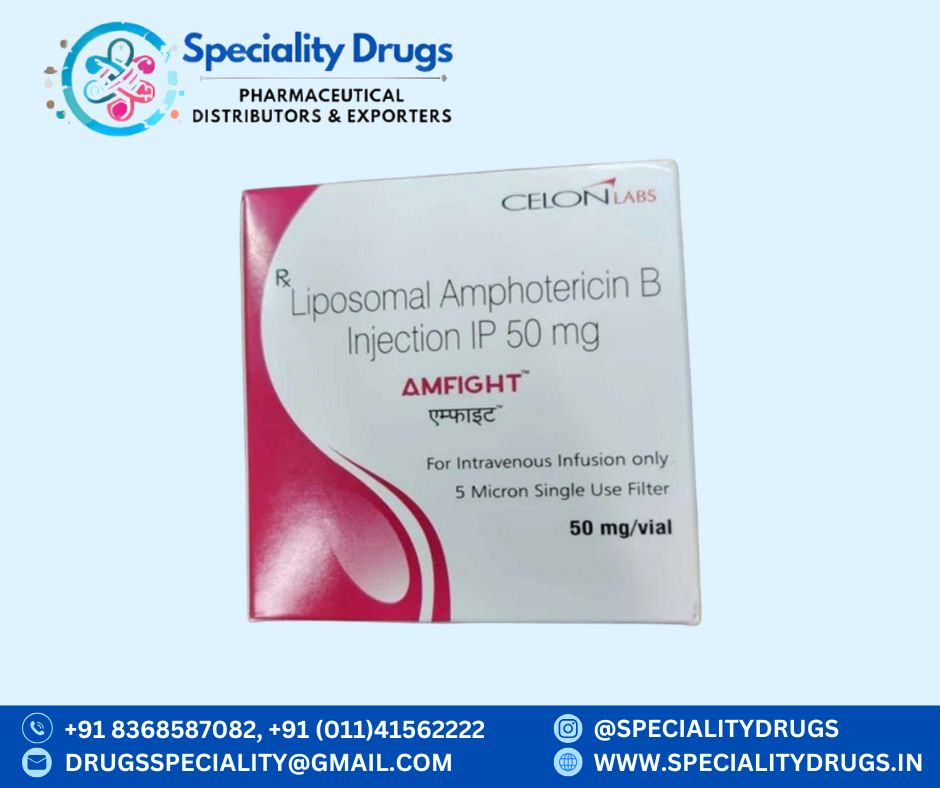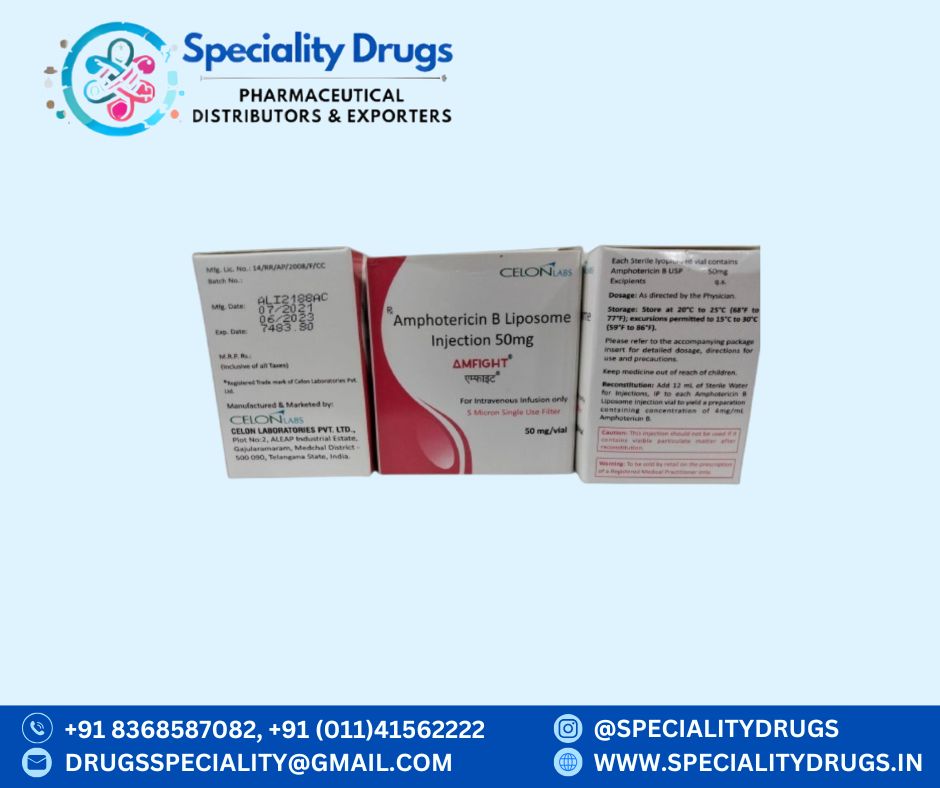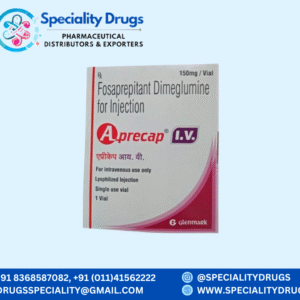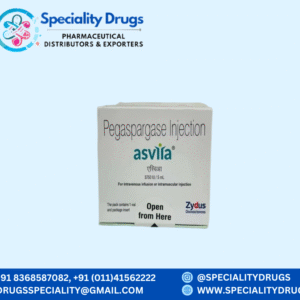What is AMFIGHT (AMPHOTERICN-B)?
AMFIGHT is a pharmaceutical formulation of Amphotericin B, a potent antifungal medication used in the treatment of serious, life-threatening fungal infections. It belongs to the polyene class of antifungals and is known for its broad-spectrum activity against a wide range of fungi and yeasts. AMFIGHT is typically administered intravenously under hospital supervision due to its strength and potential for side effects.
What is the Use of AMFIGHT (AMPHOTERICN-B)?
AMFIGHT (Amphotericin B) is used to treat severe systemic fungal infections, including:
-
Invasive aspergillosis
-
Cryptococcal meningitis (often in HIV/AIDS patients)
-
Candidiasis (including bloodstream infections)
-
Mucormycosis (black fungus)
-
Histoplasmosis and blastomycosis
It is particularly valuable when other antifungal treatments have failed or when the infection is resistant to first-line therapies.
Benefits of AMFIGHT (AMPHOTERICN-B)
-
✅ Broad-spectrum antifungal: Effective against many fungal species.
-
✅ Life-saving in critical infections: Often used when infections are aggressive and life-threatening.
-
✅ Proven efficacy: Trusted in clinical settings for decades.
-
✅ Often used in combination: Can be paired with other drugs for synergistic effect.
Side Effects of AMFIGHT (AMPHOTERICN-B)
Due to its potency, Amphotericin B can cause several side effects, some of which may require careful monitoring or management:
Common Side Effects:
-
Fever and chills
-
Nausea and vomiting
-
Headache
-
Hypotension (low blood pressure)
-
Injection site reactions
Serious Side Effects:
-
Nephrotoxicity (kidney damage)
-
Electrolyte imbalances (low potassium or magnesium)
-
Anemia
-
Liver function abnormalities
-
Allergic reactions
To mitigate risks, AMFIGHT is usually given in a hospital setting with regular monitoring of kidney function, electrolytes, and blood counts.
Important Notes
-
AMFIGHT should only be administered by healthcare professionals.
-
Patients with pre-existing kidney disease or those taking nephrotoxic medications require extra caution.
-
Liposomal formulations may be prescribed to reduce toxicity.
-
What is AMFIGHT (AMPHOTERICN-B)?
AMFIGHT is an antifungal medication used to treat serious, potentially life-threatening fungal infections. -
What types of infections does AMFIGHT (AMPHOTERICN-B) treat?
It is used for infections such as cryptococcal meningitis, systemic candidiasis, aspergillosis, mucormycosis (black fungus), histoplasmosis, and others. -
How is AMFIGHT (AMPHOTERICN-B) administered?
AMFIGHT is usually given intravenously (IV) under strict medical supervision in a hospital setting. -
How does AMFIGHT work?
It binds to ergosterol, a component of fungal cell membranes, creating pores that cause leakage and ultimately death of the fungal cell. -
Is AMFIGHT safe for everyone?
No. It should be used with caution in patients with kidney problems, electrolyte imbalances, or those on other nephrotoxic drugs. -
What are the most common side effects of AMFIGHT (AMPHOTERICN-B)?
Common side effects include fever, chills, nausea, vomiting, headache, and low blood pressure during infusion. -
What are the serious risks associated with AMFIGHT (AMPHOTERICN-B)?
Serious side effects include kidney damage (nephrotoxicity), low potassium/magnesium levels, anemia, and allergic reactions. -
Can AMFIGHT be taken orally?
No. Amphotericin B is not effective when taken orally for systemic infections. It must be administered intravenously. -
How long does treatment with AMFIGHT (AMPHOTERICN-B) usually last?
Duration varies depending on the infection but often ranges from a few days to several weeks. -
Is AMFIGHT effective against COVID-related fungal infections (e.g., mucormycosis)?
Yes. During COVID-19 outbreaks, it has been used to treat secondary fungal infections like mucormycosis. -
Are there different formulations of Amphotericin B?
Yes. Conventional Amphotericin B (like AMFIGHT) and liposomal/lipid-complex forms, which are less toxic to kidneys. -
Does AMFIGHT require hospitalization?
Yes. Due to its potential toxicity, it is administered in a hospital where patients can be closely monitored. -
Can AMFIGHT (AMPHOTERICN-B) interact with other medications?
Yes. It may interact with other drugs that affect the kidneys or electrolyte balance. Inform your doctor about all current medications. -
Can pregnant or breastfeeding women use AMFIGHT (AMPHOTERICN-B)?
It should only be used during pregnancy or breastfeeding if the potential benefit outweighs the risk. Always consult your doctor. -
What precautions are taken during AMFIGHT (AMPHOTERICN-B) therapy?
Regular blood tests to monitor kidney function, liver enzymes, complete blood count, and electrolytes are necessary during treatment.







Reviews
There are no reviews yet.